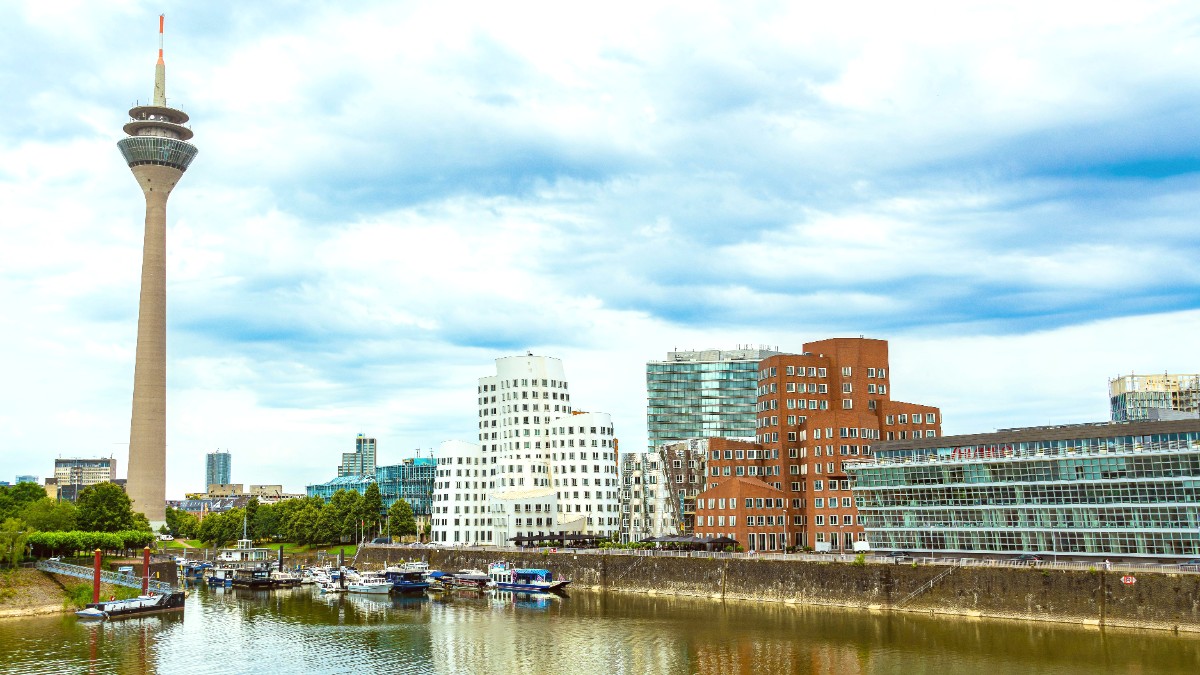
North Rhine Westphalia, Germany
Year-Round Climate Patterns:
Düsseldorf does not experience monsoons or hurricanes. Extreme temperatures, like below -10°C (14°F) or above 35°C (95°F), occur rarely, typically during severe cold snaps or heatwaves.
Weather warnings are issued when such conditions are expected.
June-August, December for Christmas Markets
Weather good for outdoor activities. Christmas markets create a festive, unique atmosphere.
Expect higher accommodation prices and more crowds at popular attractions. Book flights and hotels well in advance.
April-May, September-October
Pleasant temperatures and fewer crowds. Prices are generally lower. Good for sightseeing and cultural events.
Weather can be unpredictable, with cooler days and increased rain possible. Pack layers.
November, January-March
Significantly fewer tourists, providing a relaxed experience. Best prices for flights and hotels. Good for museum visits and indoor attractions.
Cold weather and shorter daylight hours limit outdoor activities. Some outdoor attractions may have reduced hours or be closed.
The weather is good for outdoor activities. Christmas markets in December create a festive, unique atmosphere.
Pleasant temperatures and fewer crowds compared to peak summer. Prices for flights and accommodation are generally lower. This period works well for sightseeing and enjoying cultural events. Spring showcases blooming gardens, while autumn offers colorful foliage.
A relaxed experience without large crowds.
Find better flight and hotel rates.
Good opportunity to experience local culture.
Ideal for museum visits and indoor attractions.
Cold weather and shorter daylight hours limit outdoor activities.
Prepare your travel documents and know the entry requirements for Germany. Germany forms part of the Schengen Area, impacting visa procedures for many nationalities.
Germany is part of the Schengen Area. Plan for entry.
Citizens of the United States, Canada, Australia, New Zealand, Japan, South Korea, and many other nations do not need a Schengen visa for stays up to 90 days.
Plan your budget for Düsseldorf for a comfortable trip. Costs vary depending on your travel style, from budget-friendly options to luxury experiences.
These strategies help you save money in Düsseldorf:
Prioritize your health and safety when traveling to Düsseldorf. Germany offers high standards of healthcare, and Düsseldorf maintains a safe urban environment.
Flooding: The Rhine River can experience high water levels, especially during spring thaws or heavy rainfall. However, significant, widespread flooding affecting the city center is rare due to protective measures.
Heatwaves: Short periods of high temperatures can occur in summer. Stay hydrated and seek air-conditioned spaces. Storms: Occasional strong winds and thunderstorms can occur, notably in summer. Local weather alerts advise on severe conditions.
No specific vaccinations are necessary for entry from most countries. Routine vaccinations are good to be up-to-date. Hepatitis A and B vaccines are generally good for travelers. Consult a healthcare professional before your trip.
Ensure routine vaccinations are current.
No specific required vaccinations for most countries.
Common health concerns include seasonal allergies, minor illnesses like colds or flu, and sunburn. Practice standard hygiene, like frequent handwashing.
Pack allergy medication if needed. Practice hand hygiene.
Forget sunscreen in summer months.
Germany offers a high-quality healthcare system. Call 112 for ambulance or fire, 110 for police. Pharmacies (Apotheke) are available. Emergency pharmacies for off-hours.
English-speaking doctors common. Hospitals are well-equipped.
Not knowing emergency numbers.
| Category | Safety/Hygiene | Notes |
|---|---|---|
| Drinking Water | Safe and excellent quality. | Drink directly from the tap without concern. |
| Food Hygiene | Strict standards. | Restaurants and establishments are regulated. Street food is generally safe. |
| Natural Disasters | Low risk. | Flooding is rare due to protective measures. Heatwaves and storms can occur. |